英语英美英语差别(比较全面)
英语英美英语差别(比较全面)[优质ppt]
![英语英美英语差别(比较全面)[优质ppt]](https://img.taocdn.com/s3/m/20765c8c49649b6649d74755.png)
neither [‘naiðə ] [‘ni:ðə]
schedule [‘ʃedju:l] [‘skedʒjul]
3. 语法差异
(1)名词:
除上文讨论的词尾变化不同外。美国英
语将其他词类名词化的倾向比英国英语
更为明显,特别是那些带介词的短语动 词:to cook out →a cook-out ;to know how →the know-how; to run down →the rundown; to be shut in →a shut-in; to stop over →the stopover等。
3. 语法差异
(4)过去时与现在完成时:
表示距现在不远的过去所发生或完成的事情,英 国英语常用现在完成时,则美国英语则倾向于使 用一般过去时。例如: BE:I have studied your report already. AE:I studied your report already. BE:Now I know what it is! I’ve forgotten its name. AE:Now I know what it is! I forgot its name.
3. 语法差异
(2)动词 have ,get, make
当动词have有致使之意时,美国用have; 英国对上级用get,对下级用make.英语中 的to have 是个词性不明确的动词。英国 人既把它用作助动词又把它用作实义动词
;美国人则一律将它当作实义动词来用。
例如: BE: I will get someone come. AE: I will have someone come.
对话
A.E dialog
B.E dialogue
英国英语和美国英语的差异
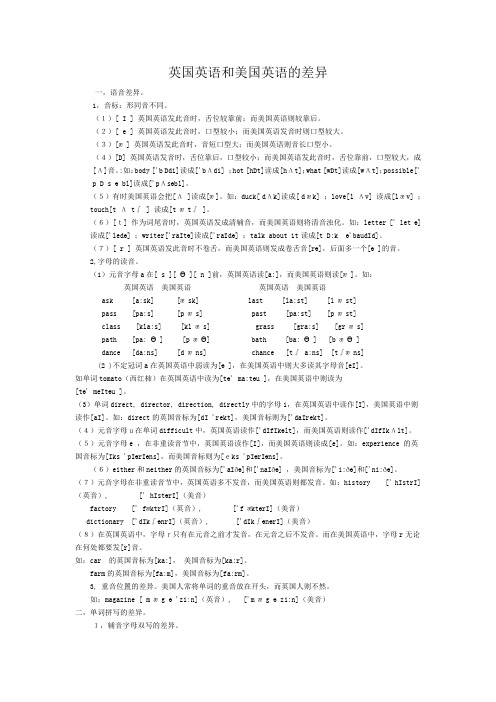
英国英语和美国英语的差异一,语音差异。
1,音标:形同音不同。
(1)[ I ] 英国英语发此音时,舌位较靠前;而美国英语则较靠后。
(2)[ e ] 英国英语发此音时,口型较小;而美国英语发音时则口型较大。
(3)[æ ] 英国英语发此音时,音短口型大;而美国英语则音长口型小。
(4)[D] 英国英语发音时,舌位靠后,口型较小;而美国英语发此音时,舌位靠前,口型较大,成[Λ]音。
:如:body ['b Ddi]读成['bΛdi] ;hot [hDt]读成[hΛt];what [wDt]读成[wΛt];possible[' p D s ə bl]读成['pΛsəbl]。
(5)有时美国英语会把[Λ ]读成[æ ]。
如:duck[ dΛk]读成[ d æ k] ;love[l Λv] 读成[l æ v] ;touch[t Λ t∫ ] 读成[t æ t∫ ]。
(6)[t] 作为词尾音时,英国英语发成清辅音,而美国英语则将清音浊化。
如:letter [' let ə]读成['ledə] ;writer['raItə]读成['raIdə] ;talk about it读成[t D:k ə'baudId]。
(7)[ r ] 英国英语发此音时不卷舌,而美国英语则发成卷舌音[rə],后面多一个[ə ]的音。
2,字母的读音。
(1)元音字母a在[ s ][ Ө ][ n ]前,英国英语读[a:],而美国英语则读[æ ]。
如:英国英语美国英语英国英语美国英语ask [a:sk] [æ sk] last [la:st] [l æ st]pass [pa:s] [p æ s] past [pa:st] [p æ st]class [kla:s] [kl æ s] grass [gra:s] [gr æ s]path [pa: Ө] [p æ Ө] bath [ba: Ө] [b æ Ө ]dance [da:ns] [d æ ns] chance [t∫ a:ns] [t∫æ ns](2 )不定冠词a在英国英语中弱读为[ə ],在美国英语中则大多读其字母音[eI]。
美式英语与英式英语的区别
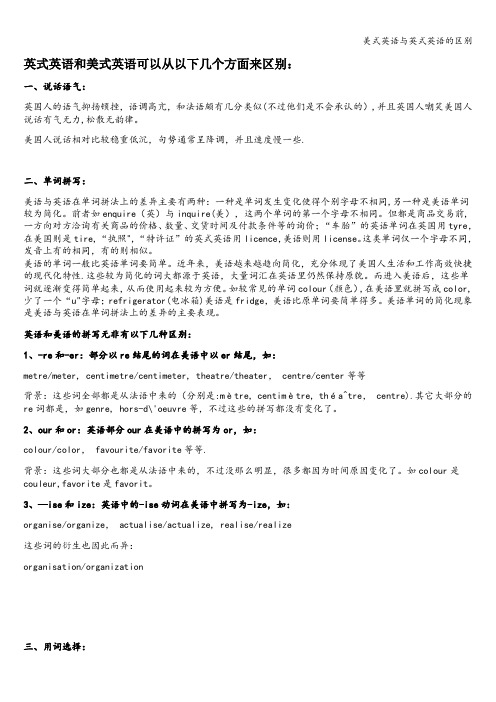
英式英语和美式英语可以从以下几个方面来区别:一、说话语气:英国人的语气抑扬顿挫,语调高亢,和法语颇有几分类似(不过他们是不会承认的),并且英国人嘲笑美国人说话有气无力,松散无韵律。
美国人说话相对比较稳重低沉,句势通常呈降调,并且速度慢一些.二、单词拼写:美语与英语在单词拼法上的差异主要有两种:一种是单词发生变化使得个别字母不相同,另一种是美语单词较为简化。
前者如enquire(英)与inquire(美),这两个单词的第一个字母不相同。
但都是商品交易前,一方向对方洽询有关商品的价格、数量、交货时间及付款条件等的询价;“车胎”的英语单词在英国用tyre,在美国则是tire,“执照",“特许证”的英式英语用licence,美语则用license。
这类单词仅一个字母不同,发音上有的相同,有的则相似。
美语的单词一般比英语单词要简单。
近年来,美语越来越趋向简化,充分体现了美国人生活和工作高效快捷的现代化特性.这些较为简化的词大都源于英语,大量词汇在英语里仍然保持原貌。
而进入美语后,这些单词就逐渐变得简单起来,从而使用起来较为方便。
如较常见的单词colour(颜色),在美语里就拼写成color,少了一个“u"字母;refrigerator(电冰箱)美语是fridge,美语比原单词要简单得多。
美语单词的简化现象是美语与英语在单词拼法上的差异的主要表现。
英语和美语的拼写无非有以下几种区别:1、-re和-er:部分以re结尾的词在美语中以er结尾,如:metre/meter, centimetre/centimeter, theatre/theater, centre/center等等背景:这些词全部都是从法语中来的(分别是:mètre, centimètre, théa^tre, centre).其它大部分的re词都是,如genre, hors-d\'oeuvre等,不过这些的拼写都没有变化了。
英国英语和美国英语区别大总结
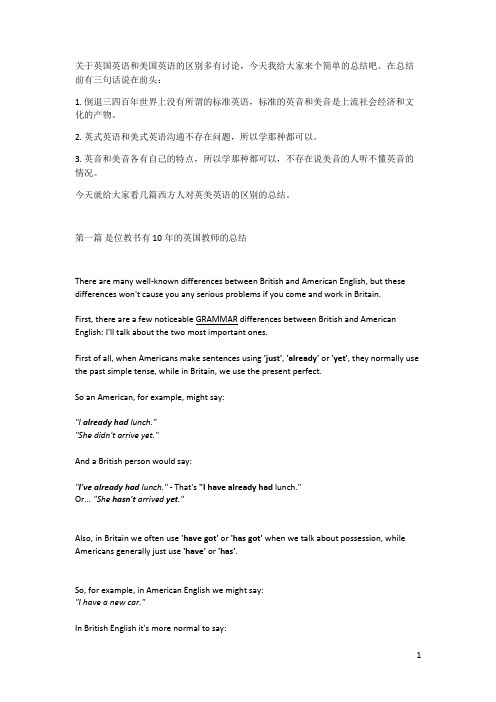
关于英国英语和美国英语的区别多有讨论,今天我给大家来个简单的总结吧。
在总结前有三句话说在前头:1. 倒退三四百年世界上没有所谓的标准英语,标准的英音和美音是上流社会经济和文化的产物。
2. 英式英语和美式英语沟通不存在问题,所以学那种都可以。
3. 英音和美音各有自己的特点,所以学那种都可以,不存在说美音的人听不懂英音的情况。
今天就给大家看几篇西方人对英美英语的区别的总结。
第一篇是位教书有10年的英国教师的总结There are many well-known differences between British and American English, but these differences won't cause you any serious problems if you come and work in Britain.First, there are a few noticeable GRAMMAR differences between British and American English: I'll talk about the two most important ones.First of all, when Americans make sentences using 'just', 'already' or 'yet', they normally use the past simple tense, while in Britain, we use the present perfect.So an American, for example, might say:"I already had lunch.""She didn't arrive yet."And a British person would say:"I've already had lunch." - That's "I have already had lunch."Or... "She hasn't arrived yet."Also, in Britain we often use 'have got' or 'has got' when we talk about possession, while Americans generally just use 'have' or 'has'.So, for example, in American English we might say:"I have a new car."In British English it's more normal to say:"I've got a new car."The meaning's the same, there's just a small grammatical difference that you might notice.There are these and a few other very small differences, but to be honest, these differences almost never make it difficult for us to understand each other.On the other hand, the differences in VOCABULARY between American English and British English are stronger than the grammatical differences, but again, these very rarely cause serious problems.A lot of the words which are different are informal or slang words...For example, I think many Americans would be unfamiliar with the British slang word 'naff', which means 'un-cool' or 'poor-quality'.On the other hand, a Brit (a British person) might be very confused by a sentence like:"The café is kitty-corner to the pharmacy."This means that the café is diagonally opposite to the pharmacy, but we don't have the word'kitty-corner' in British English.Another example would be telling the time...If we want to describe 2:45 in Britain, we might say:"Quarter to three", or 3:15 would be "Quarter past three".On the other hand, in America, these might be:"Quarter of three" for 2:45, or "Quarter after three" for 3:15.It's another small difference, but it's one that's not going to cause serious problems - it's quite easy to get used to.There are also some differences in SPELLING which I should mention.One example of this is the verb 'to practise':In British English, this is spelt with an 'S', so that'sP-R-A-C-T-I-S-E.In American English, it's spelt with two 'C's, so in American English it'sP-R-A-C-T-I-C-E.And there are lots of other examples of slight difference of spelling, but about 99% of the time, British and American people can understand each other without any trouble at all. In Britain we watch lots of American films and TV programs, and we listen to lots of American music, so American English is generally very familiar to us.This is probably not quite so true for an American coming to Britain. Americans, I think, don't watch quite so much British TV or British movies.I should also point out that regional English can be an important thing to think about. Not everyone in Britain talks like James Bond. There are some regional accents in Britain which you don't hear so often in the movies, and these might be a bit more difficult to get used to.However, I'd like to finish by saying that many, many Americans live and work in Britain, and they don't have any serious language problems at all. So, Brittney, my advice to you is: don't worry about the language, you'll be fine!第二篇关于两种拼写牛津在线词典给了详细的说明British and American spellingThere are several areas in which British and American spelling are different. These are the main ones to be aware of.Words ending in –reBritish English words that end in -re often end in -er in American English:Words ending in -ourBritish English words ending in -our usually end in -or in American English:Words ending in -ize or -iseVerbs in British English that can be spelled with either -ize or -ise at the end are always spelled with -ize at the end in American English:Words ending in -yseVerbs in British English that end in -yse are always spelled -yze in American English:Words ending in a vowel plus lIn British spelling, verbs ending in a vowel plus l double the l when adding endings that begin with a vowel. In American English, the l is not doubled:Words spelled with double vowelsBritish English words that are spelled with the double vowels ae or oe are just spelled with an e in American English:Note that in American English, certain terms, such as archaeology, keep the ae spelling as standard, although the spelling with just the e (i.e. archeology) is usually acceptable as well.Nouns ending with –enceSome nouns that end with -ence in British English are spelled -ense in American English:Nouns ending with –ogueSome nouns that end with -ogue in British English end with either -og or -ogue in American English:The distinctions here are not hard and fast. The spelling analogue is acceptable but not very common in American English; catalog has become the US norm, but catalogue is not uncommon; dialogue is still preferred over dialog.Aside from spelling differences, many items and practices have different names in British and American English. To explore further, see British and American terms.第三篇这位老师给了更详细的一个说明IntroductionSpeakers of American English generally use the present perfect tense (have/has + past participle) far less than speakers of British English. In spoken American English it is very common to use the simple past tense as an alternative in situations where the present perfect would usually have been used in British English. The two situations where this is especially likely are:(i) In sentences which talk about an action in the past that has an effect in the present: American English / British English•Jenny feels ill. She ate too much.•Jenny feels ill. She's eaten too much.•I can't find my keys. Did you see them anywhere?•I can't find my keys. Have you seen them anywhere?(ii) In sentences which contain the words already, just or yet:American English / British English•A: Are they going to the show tonight?•B: No. They already saw it.•A: Are they going to the show tonight?•B: No. They've already seen it.•A: Is Samantha here?•B: No, she just left.•A: Is Samantha here?•B: No, she's just left.•A: Can I borrow your book?•B: No, I didn't read it yet.•A: Can I borrow your book?•B: No, I haven't read it yet.1. Verb agreement with collective nounsIn British English collective nouns, (i.e. nouns referring to particular groups of people or things), (e.g. staff , government, class, team) can be followed by a singular or plural verb depending on whether the group is thought of as one idea, or as many individuals, e.g.:My team is winning.The other team are all sitting down.In American English collective nouns are always followed by a singular verb, so an American would usually say:Which team is losing?whereas in British English both plural and singular forms of the verb are possible, as in:Which team is/are losing?2. Use of delexical verbs have and takeIn British English, the verb have frequently functions as what is technically referred to as a delexical verb, i.e. it is used in contexts where it has very little meaning in itself but occurs with an object noun which describes an action, e.g.:I'd like to have a bath.Have is frequently used in this way with nouns referring to common activities such as washing or resting, e.g.:She's having a little nap.I'll just have a quick shower before we go out.In American English, the verb take, rather than have, is used in these contexts, e.g.:Joe's taking a shower.I'd like to take a bath.Let's take a short vacation.Why don't you take a rest now?3. Use of auxiliaries and modalsIn British English, the auxiliary do is often used as a substitute for a verb when replying to a question, e.g.:•A: Are you coming with us?•B: I might do.In American English, do is not used in this way, e.g.:•A: Are you coming with us?•B: I might.In British English needn't is often used instead of don't need to, e.g.:They needn't come to school today.They don't need to come to school today.In American English needn't is very unusual and the usual form is don't need to, i.e.:They don't need to come to school today.In British English, shall is sometimes used as an alternative to will to talk about the future, e.g.:I shall/will be there later.In American English, shall is unusual and will is normally used.In British English shall I / we is often used to ask for advice or an opinion, e.g.:Shall we ask him to come with us?In American English should is often used instead of shall, i.e.:Should we ask him to come with us?4. Use of prepositionsIn British English, at is used with many time expressions, e.g.:at Christmas/five 'o' clockat the weekendIn American English, on is always used when talking about the weekend, not at, e.g.:Will they still be there on the weekend?She'll be coming home on weekends.In British English, at is often used when talking about universities or other institutions, e.g.: She studied chemistry at university.In American English, in is often used, e.g.:She studied French in high school.In British English, to and from are used with the adjective different, e.g.:This place is different from/to anything I've seen before.In American English from and than are used with different, e.g.:This place is different from/than anything I've seen before.In British English to is always used after the verb write, e.g.:I promised to write to her every day.In American English, to can be omitted after write, i.e.:I promised to write her every day.5. Past tense formsBelow is a table showing verbs which have different simple past and past participle forms in American and British English. Note that the irregular past forms burnt, dreamt and spoilt are possible in American English, but less common than the forms ending in -ed.Infinitive Simple past(Br) Simple past(Am)Past participle(Br)Past participle(Am)burn burned/ burned/ burned/ burned/(Br) (Am) (Br) (Am)burnt burnt burnt burnt bust bust busted bust busteddive dived dove/diveddived diveddream dreamed/dreamt dreamed/dreamtdreamed/dreamtdreamed/dreamtget got got got gottenlean leaned/leant leaned leaned/leantleanedlearn learned/learnt learned learned/learntlearnedplead pleaded pleaded/pled pleaded pleaded/pledprove proved proved proved proved/provensaw sawed sawed sawn sawn/sawedsmell smelled/smelt smelled smelled/smeltsmelledspill spilled/spilt spilled spilled/spiltspilled(Br) (Am) (Br) (Am)spoil spoiled/spoilt spoiled/spoiltspoiled/spoiltspoiled/spoiltstink stank stank/stunkstunk stunkwake woke woke/wakedwoken wokenNote that have got is possible in American English, but is used with themeaning 'have', gotten is the usual past participle of get, e.g.American English British EnglishYou've got two brothers(= you have two brothers)You've got two brothersYou've gotten taller this year You've got taller this year6. Implications for teachingThe two major varieties of EnglishThe two varieties of English most widely found in print and taught around the world are British and American - it is therefore important for teachers to be aware of the major differences between the two. And while lexical differences are the easiest ones to notice, a knowledge of grammatical and phonological differences can be useful not only for teachers to be aware of, but also to be able to deal with should they come up in class.Which is better?An important point to make is that different doesn’t mean wrong. Comments such as “American English is inferior to British English”, or “American English is better than British English” have no solid basis other than the speaker’s opinion. The truth is that no language or regional variety of language is inherently better or worse than another. They are just different. Students will often have very firm beliefs on which English they think isbetter/easier to understand/clearer etc. While it may be true for that particular individual,there is no evidence to suggest that one variety is easier to learn or understand than the other.Materials and varietiesIf you are an American English speaker teaching with a British coursebook or vice versa, what do you say when the book is different from your English? The answer here is to point out the difference. The differences are not so numerous as to overload the students and often can be easily dealt with. For example, if you are an American English speaker using a lesson that has just included “at the weekend” it takes very little time to point out that in American English people say “on the weekend”. Accept either from your students then. If you decide to go along with the book and say “at the weekend” yourself, you’ll probably sound unnatural, and “on the weekend” might slip out anyway!Exams and essay writingIn most international exams, both varieties of English are accepted. However, while writing for an international exam (or writing in English generally) students should try to remain consistent. That means if they favour (or favor) American spelling and grammar, they should stick to that convention for the whole piece of writing.What role do other varieties of English have in the classroom?Although British and American varieties are the most documented, there are of course many other varieties of English. Scotland, Ireland, South Asia, Canada, Australia, New Zealand, West Africa, the Caribbean, South Africa all have their own regional variations of English. The decision whether or not to highlight aspects of these Englishes would depend on two factors:if the students are going to live, or are already living, in one of these places - in which case the need to understand specific aspects of that English is clear; orif the teacher is from one of those places and therefore speaks a regional variation of English. In this case it could be useful to occasionally point out differences between your English and that of your Anchor Point:bottomcoursebook (see point 3 above about using your own variety).。
英美英语差异
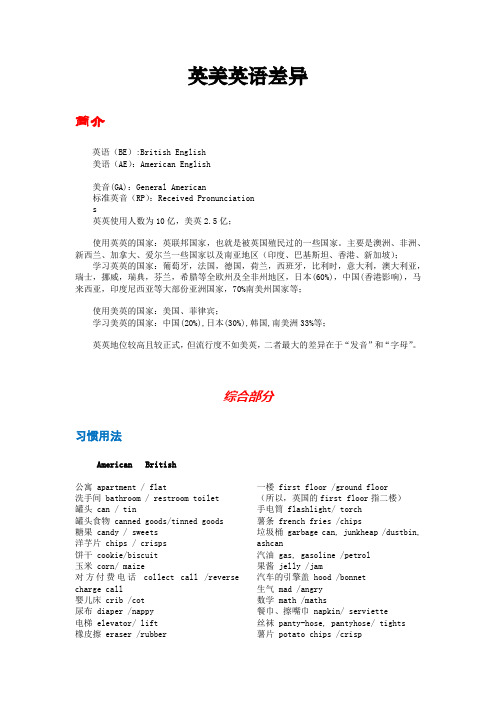
英美英语差异简介英语(BE):British English美语(AE):American English美音(GA):General American标准英音(RP):Received Pronunciations英英使用人数为10亿,美英2.5亿;使用英英的国家:英联邦国家,也就是被英国殖民过的一些国家。
主要是澳洲、非洲、新西兰、加拿大、爱尔兰一些国家以及南亚地区(印度、巴基斯坦、香港、新加坡);学习英英的国家:葡萄牙,法国,德国,荷兰,西班牙,比利时,意大利,澳大利亚,瑞士,挪威,瑞典,芬兰,希腊等全欧州及全非州地区,日本(60%),中国(香港影响),马来西亚,印度尼西亚等大部份亚洲国家,70%南美州国家等;使用美英的国家:美国、菲律宾;学习美英的国家:中国(20%),日本(30%),韩国,南美洲33%等;英英地位较高且较正式,但流行度不如美英,二者最大的差异在于“发音”和“字母”。
综合部分习惯用法American British公寓 apartment / flat洗手间 bathroom / restroom toilet罐头 can / tin罐头食物 canned goods/tinned goods糖果 candy / sweets洋芋片 chips / crisps饼干 cookie/biscuit玉米 corn/ maize对方付费电话collect call /reverse charge call婴儿床 crib /cot尿布 diaper /nappy电梯 elevator/ lift橡皮擦 eraser /rubber 一楼 first floor /ground floor(所以,英国的first floor指二楼)手电筒 flashlight/ torch薯条 french fries /chips垃圾桶 garbage can, junkheap /dustbin, ashcan汽油 gas, gasoline /petrol果酱 jelly /jam汽车的引擎盖 hood /bonnet生气 mad /angry数学 math /maths餐巾、擦嘴巾 napkin/ serviette丝袜 panty-hose, pantyhose/ tights薯片 potato chips /crisp手提包 purse/pocketbook handbag 足球 soccer /football来回票 roundtrip/ return人行道 sidewalk /pavement炉子 stove/ cooker毛衣 sweater/ jersey, jumper卡车 truck /lorry汽车后面的行李箱 trunk /boot假期 vacation /holiday行李 baggage/ luggage高速公路 freeway/motorway雨伞 umbrella/ brollie汽车motorbile/ car大学校长president/chancellor秋天fall/autumn 停车场parking lot/car park运动衣sweater/jumper卡车truck/lorry人行道sidewalk/pavement商店store/shop水龙头faucet/tap运动鞋sneakers/trainers长裤pants/trousers地铁subway/tube行人穿行道pedestrian crossing/zebra crossing长筒靴rubber boots/wellingtons内裤drawers/pants(在美国却是长裤,英国的长裤为trousers)1.Z的不同读法:美语念/zi:/,英语念/zed/2.别客气和欢迎你:美国人表示“别客气”,“不用提”等意思,常说 You're welcome。
英国英语与美国英语的差别
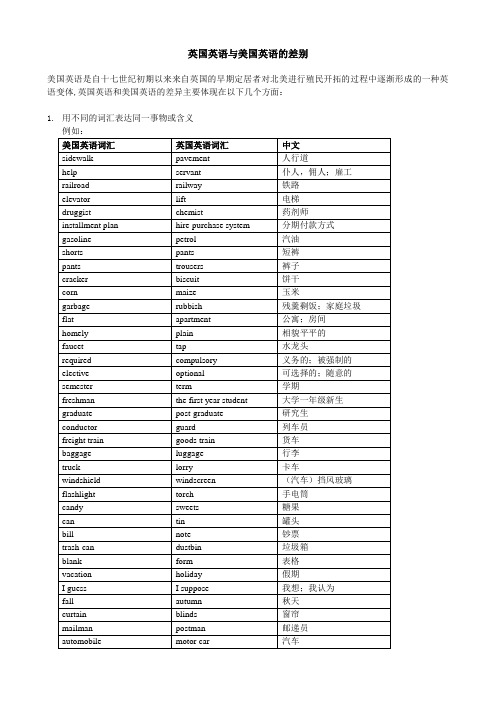
Please write to me soon
on the street
in the street
5.日期表达的差异
美国英语日期表达
英国英语日期表达
July 4
4thJuly
6.英国英语中的某些不规则动词在美国英语中常用作规则动词
例如:
动词
美国英语变体
英国英语变体
postman
邮递员
automobile
motor car
汽车
2.同一词汇表达不同的意思
例如:
词汇
美国英语意思
英国英语意思
mean
生气的;脾气不好的
小气的;吝啬的
date
约会
日期
dresser
梳妆台
碗柜;食橱
billion
十亿
万亿
biscuit
软饼
苏打饼干
overall
工装裤
紧身裤
3.某些后缀的拼写差异
flashlight
torch
手电筒
candy
sweets
糖果
can
tin
罐头
bill
note
钞票
trash-can
dustbin
垃圾箱
blank
form
表格
vacation
holiday
假期
I guess
I suppose
我想;我认为
fall
autumn
秋天
curtain
blinds
窗帘
mailman
例如:
美国英语使用的后缀
英国英语使用的后缀
最全的英美词汇差异对比

最全的英美词汇差异对比美国英语单词大全与英式英语单词对比词汇大全,美国英语单词和英国英语单词在拼写和发音方面有许多区别,下面的词汇列表,列举出了英国英语和美国英语单词中的差别,具有差别的英语单词大全。
汉/英/美飞机aeroplane/airplane航空邮件air-post/air-mail对……(人)生气angrywith/ angry at垃圾箱ash-bin(dust-bin) /ashcan秋autumn/fall面包店bakery/bakehouse纸币(bank-)note/ (bank-)bill理发厅barber"s shop/ barber shop浴盆bath/bathtub浴室bathroom/bath寝具bedclothes/covers饼干biscuit/cracker百叶窗blind/shade公寓block offlats /apartment house宿舍boardinghouse/ dormitory预约booking/reservation售票处booking-office/ ticket-office长筒鞋boot/shoe圆顶黑色高帽bowler/derby裤子的吊带braces/suspenders小憩时间break/recess中途下车breakone"s journey /stop over 白洋布、印花布calico/ printed cloth旅行队,篷车caravan/ trailer客车carriage/coach游览车charabanc/sightseeing bus药局chemist"s shop /drugstore支票cheque/check衣柜chest-drawers/ bureau教名Christianname/ first name电影院cinema/picture house寄物处,衣帽间cloakroom /checkroom 光头close crop/crew out衣夹clothes-peg/ clothes-pin公共汽车coach/bus雄鸡cock/rooster魔术师conjuror/magician蒸汽锅cooker/stove谷物corn/grain棍棒cosh/blackjack领带cravat/(neck)tie十字路口cross-roads/ intersection碗柜cupboard/closet窗帘curtain/drape煎报cutting/clipping骑自行车的人cyclist/cycler舞厅dancingsaloon/ dance ball死者,故人deceased/ decedent无尾礼服dinner-jacket /tuxedo抹布dish-cloth/dish towel老资格,老前辈doyen/dean绸缎店draper"s shop /dry-goods store 西洋象棋draughts/checkers客厅drawingroom/ parlor睡衣dressing-gown /bathrobe酒类饮料drink/liquor偶然拜访drop in/drop by垃圾箱dust-bin/ashcan公司的休憩时间elevenses /coffee break雇佣engage/hire机车,车头engine/locomotive过分excessively/ overly快递expressdelivery post/ special delivery mail 战争fighting/combat消防队fire-brigade/ fire-department二楼firstfloor/ second floor鱼类,海味fish/sea food鱼贩fish-monger/ fish-dealer花线,皮线flex/electric cord人行道footway/side walk空格表form/blank二星期fortnight/two weeks句点full stop/period橡皮套鞋galoshes/rubbers监狱gaol/jail再见good-bye/good-by货车goodstrain/ freight train卡车goodswaggon /freight car食品杂货店grocer"s shop/ grocery store 一楼ground floor/first floor车掌guard/conductor长筒橡皮套鞋overshoes /gum boots大炮cannon/gun争价,还价haggle/dicker一半half a / ahalf门厅,回廊hall/hallway长筒靴high boot/boot休假holiday/vacation旅馆的侍者hotelpage/ bellboy有病的ill /sick旅馆主人innkeeper/innholder演出休息时间interval/ intermission铁器店ironmonger"s/ hardware store水罐jug/pitcher街道的边石kerb/curb邮票,印花税票label/sticker化妆室ladies" cloakroom /powder room 地崩,山崩landslip/landslide厕所lavatory/washroom电梯,升降机lift/elevator铁路line/road寄宿者lodger/roomer卡车lorry/truck西装lounge suit/sack coat行李luggage/baggage主要街道,大路mainroad /highway玉米maize/corn汽车(motor)car/auto(mobile)市政厅municipaloffice/ city hall音乐厅,演艺馆musichall/ variety house 棉布muslin/calico零naught,nought zero通讯社news-agent/ news-dealer单据夹note-case/billfold告示notice/bulletin校友lod boys(girls)/ alumni大衣,外套overcoat/ topcoat(纸牌的)一组pack(of cards) /deck内裤,短裤pants/shorts小包,包裹parcel/package挂布pelmet/valance婴儿车perambulator/ pram baby carriage 也许perhaps/maybe汽油petrol/gasoline电影pictures/movies邮筒pillar-box/letter-box(电器)接头point/outlet转辙手pointman/switchman职业的professional /career公共电话publiccall-box/ pay station酒馆,酒店publichouse /tavern(车胎等)爆坏puncture /become flat钱包,皮夹purse/pocket-book睡衣pyjamas/pajamas赛马场race course/racetrack铁路railway/railroad电冰箱refrigerator/ icebox来回车票returnticket /round-trip ticket挂断电话ring off/hang up打电话ring up/call人行道roadway/pavement圆环roundaboutrotary, traffic circle垃圾堆rubbish-heap/ trash heap围毯rug/robe解雇sack/fire大麦饼scone/biscuit海sea/ocean定期票,长期票seaonticket /commutation ticket 抵押security/collateral鞋子shoe/oxford擦皮鞋shoe-black/boot-black商店shop/store店员shopassistant/ clerk女店员sjpp-girl/salesgirl颊发side-shiskers/ sideburns单程车票singleticket/ one-way ticket地基,地点site/lot枕木sleepers/crossties袜带suspenders/garters律师solicitor/lawyer螺丝起子spanner/wrench眼镜spectacles/eyeglasses毕业典礼speechday /commencement教员staff/faculty公立学校stateschool /public school停留stay/stopper石头stone/rock地下道subway /underpass日出sunrise/sunup餐后甜点sweet/course dessert糖果sweets/candy燕尾服tail-coat/cutaway水龙头tap/faucet终点terminus/terminal大公寓,大杂院tenements /flat神秘小说,侦探小说thriller/ mystery story截止期限time-limit /deadline时间表timetable/schedule罐头食品tinnedgoods/ canned goods 手电筒torch/flashlight城市town/city电车tram carstreet car/ trolley长途电话trunkcall /long-distance call 裤子trousers/pants地下铁路tube/subway裤管的反折turn-ups/ cuffs地下铁路underground /subway傧仪业者undertaker/ mortician贴身内衣underwear/ undershirt杂项表演variety/burlesque阳台veranda/porch贴身内衣vest/undershirt名片visitingcard/ calling card背心waist-coat/vest洗礼日washingday/ wash-day酒店winemerchant/ liquor store学而不思则惘,思而不学则殆无线电wireless/radio工作时间workingday /workday工厂works/factory。
英式英语和美式英语的不同

英式英语和美式英语的不同虽然英语口语中有很多其他方言,但美国和英国是最常见的ESL/ESOL/EFL课程。
也许这是因为赴美学生有数百万之多,而英国口音真的很迷人。
下面给大家带来一些关于英式英语和美式英语的不同,希望对大家有所帮助。
一.拼写有差异英式英语和美式英语两者的拼写大体是相同的,但是有个别细节有差距。
类似的词语还有很多,其实总结下来美国英语词尾多为-or、-ter、-og、-ize、-ction等;英国英语更喜欢用-our、-tre、-ogue、-ise、-xion等来作为单词的结尾。
另外,如果实在是不能熟练使用英式英语的拼写习惯,那就用美式英语好了,当然这只是权宜之计,最好还是要学会英式的拼写。
但是注意千万不要两者混用啊,这样看起来很奇怪。
二.用词不同在词汇的使用上,最能够表现出来英式和美式英语的差异。
相比英国英语而言,美式英语更加具有包容性和多样性,对各种文化的吸收借鉴也顺带融合了各种文化的语言特色;而英国的词汇使用更加复古和传统。
当然,美国英语的大部分词汇都来自英国英语,因为美国曾经是英国的殖民地,但是自从美国独立后,其语言就开始变化了。
举个简单的例子,美国人秋天一般用Fall,英国人却用的Autumn;人行道在美国是Sideway,英国使用Pavement。
其实语言只是习惯问题,词汇的区别主要是常用于不常用的区别,所以偶尔是可以相互替换的,但是有个别的词汇语义相差非常大。
比如在买票的时候,英国称单程或者双程为“ Single or Return”,而在美国用“ One Way or Round Trip”表示,所以在英国买票的时候千万不要以为售票员在问你是否要一张票。
还比如,英国的一楼是Ground Floor,二楼是First Floor;美国First Floor就表示一楼啦。
三.发音要区别英式英语发[w]的地方,美国英语习惯发音为[hw];When、What、Whale、Which、Why等等单词都是这样。
美式英语与英式英语的区别
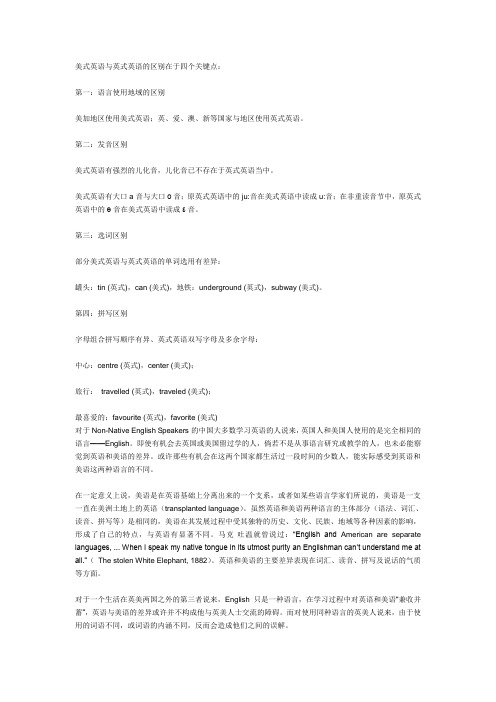
美式英语与英式英语的区别在于四个关键点:第一:语言使用地域的区别美加地区使用美式英语;英、爱、澳、新等国家与地区使用英式英语。
第二:发音区别美式英语有强烈的儿化音,儿化音已不存在于英式英语当中。
美式英语有大口a音与大口ο音;原英式英语中的ju:音在美式英语中读成u:音;在非重读音节中,原英式英语中的ə音在美式英语中读成ε音。
第三:选词区别部分美式英语与英式英语的单词选用有差异:罐头:tin (英式),can (美式),地铁:underground (英式),subway (美式)。
第四:拼写区别字母组合拼写顺序有异、英式英语双写字母及多余字母:中心:centre (英式),center (美式);旅行:travelled (英式),traveled (美式);最喜爱的:favourite (英式),favorite (美式)对于Non-Native English Speakers的中国大多数学习英语的人说来,英国人和美国人使用的是完全相同的语言——English。
即使有机会去英国或美国留过学的人,倘若不是从事语言研究或教学的人,也未必能察觉到英语和美语的差异。
或许那些有机会在这两个国家都生活过一段时间的少数人,能实际感受到英语和美语这两种语言的不同。
在一定意义上说,美语是在英语基础上分离出来的一个支系,或者如某些语言学家们所说的,美语是一支一直在美洲土地上的英语(transplanted language)。
虽然英语和美语两种语言的主体部分(语法、词汇、读音、拼写等)是相同的,美语在其发展过程中受其独特的历史、文化、民族、地域等各种因素的影响,形成了自己的特点,与英语有显著不同。
马克·吐温就曾说过:“English and American are separate languages, ... When I speak my native tongue in its utmost purity an Englishman can’t understand me at all.”(The stolen White Elephant, 1882)。
英语英美英语差别(比较全面)

football
vacation
holiday
can
tin
candy
sweets
1. 单词差异
A.E 公寓 apartment
B.E flat
洗手间bathroom restroom toilet
橡擦皮 eraser
rubber
手电筒flashlight
torch
薯条 potato chips
crisp
[iðɚ]
issue
[‘isju:] [‘iʃu:]
leisure [‘leʒə ] [‘li:ʒɚ]
neither [‘naiðə ] [‘ni:ðə]
schedule [‘ʃedju:l] [‘skedʒjul]
3. 语法差异
(1)名词:
除上文讨论的词尾变化不同外。美国英
语将其他词类名词化的倾向比英国英语
舌头大挑战
1.Good cookies could be cooked by a good cook if a good cook could cook good cookies.
2.Ann sent Andy ten hens and Andy sent Ann ten pens.
3.Good cookies could be cooked by a good cook if a good cook could cook good cookies.
A.E organize
B.E organise
组织 organization organisation
意识到 realize
realise
3. 发音差异一
1. a: ask, can't, dance, fast, half, path
外语学习记忆英国英语与美国英语

外语学习记忆英国英语与美国英语外语学习一直是很多人的追求和挑战。
而在学习英语时,我们经常会听到两个国家的英语,即英国英语和美国英语。
虽然它们有很多相似之处,但也有一些细微差别。
本文将探讨英国英语和美国英语的差异以及在学习外语时应该如何处理这些差异。
一、发音差异首先,无论是英国英语还是美国英语,发音都是最重要的方面之一。
英国英语通常以标准英语(Received Pronunciation,RP)或“皇家音标”作为基准发音。
它更加正式,强调清晰的发音和元音的准确性。
然而,美国英语则较为开放,音调更加自然,常常使用美式发音和口音,如美国南部的“r”发音方式。
因此,对于学习者来说,无论选择学习英国英语还是美国英语,熟悉当地的发音差异十分重要。
二、词汇差异除了发音上的差异外,英国英语和美国英语在词汇上也存在一些差别。
由于历史和文化的原因,一些日常用词在两种英语中的称呼不同。
例如,英国英语中使用“lorry”,而美国英语更常使用“truck”来指代卡车。
同时,一些口语表达也有所不同,例如,英国英语中使用“queue”表示排队,而美国英语使用“line”。
因此,在学习和使用英语时,我们需要对这些差异进行注意和了解。
三、拼写和语法差异拼写和语法也是英国英语和美国英语的一个区别。
英国英语通常使用较多的“ou”形式,如“colour”(颜色)、“favour”(喜爱)等,而美国英语则更倾向于用“o”形式,如“color”、“favor”。
此外,在动词和名词的单复数形式、动词时态等方面也存在着一些不同。
例如,英国英语中动词“实践”(practice)的名词形式为“practise”,而美国英语中则都为“practice”。
在写作和交流中,我们应该根据所学的英语种类来遵循相应的拼写和语法规则。
四、习语和表达差异英国英语和美国英语之间的习语和表达差异也是学习者需要注意的地方。
习语是每种语言的独特表达方式,它们往往具有一定的文化背景。
美国英语和英国英语的差异
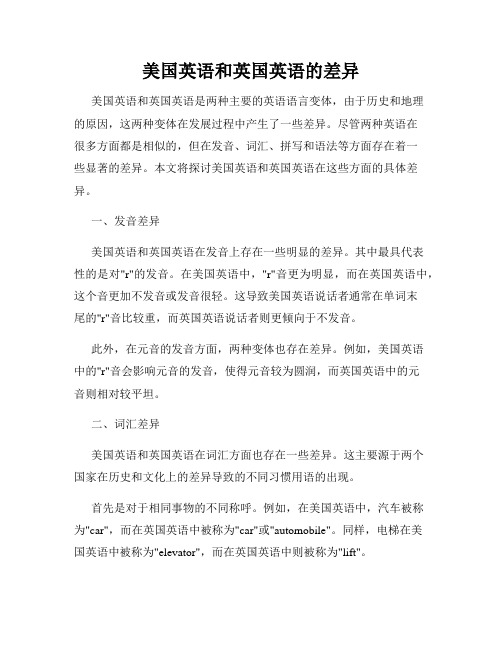
美国英语和英国英语的差异美国英语和英国英语是两种主要的英语语言变体,由于历史和地理的原因,这两种变体在发展过程中产生了一些差异。
尽管两种英语在很多方面都是相似的,但在发音、词汇、拼写和语法等方面存在着一些显著的差异。
本文将探讨美国英语和英国英语在这些方面的具体差异。
一、发音差异美国英语和英国英语在发音上存在一些明显的差异。
其中最具代表性的是对"r"的发音。
在美国英语中,"r"音更为明显,而在英国英语中,这个音更加不发音或发音很轻。
这导致美国英语说话者通常在单词末尾的"r"音比较重,而英国英语说话者则更倾向于不发音。
此外,在元音的发音方面,两种变体也存在差异。
例如,美国英语中的"r"音会影响元音的发音,使得元音较为圆润,而英国英语中的元音则相对较平坦。
二、词汇差异美国英语和英国英语在词汇方面也存在一些差异。
这主要源于两个国家在历史和文化上的差异导致的不同习惯用语的出现。
首先是对于相同事物的不同称呼。
例如,在美国英语中,汽车被称为"car",而在英国英语中被称为"car"或"automobile"。
同样,电梯在美国英语中被称为"elevator",而在英国英语中则被称为"lift"。
其次是一些不同的习惯用语。
例如,在美国英语中,人们通常使用"vacation"表示度假,而在英国英语中则更常用"holiday"来表示。
同样,晚饭在美国英语中被称为"dinner",而在英国英语中则被称为"supper"或"tea"。
三、拼写差异美国英语和英国英语在拼写上也有一些差异。
这主要源于两个国家在历史上的不同拼写传统。
其中一个明显的差异是对于某些词汇中字母的拼写。
英式美式英语区别单词举例

英式美式英语区别单词举例英式英语和美式英语是两种主要的英语语言变体,它们在拼写、发音、词汇和语法等方面存在一些差异。
下面是一些英式英语和美式英语之间的区别单词的举例:1. 拼写差异:- 英式英语:colour- 美式英语:color- 英式英语:centre- 美式英语:center- 英式英语:travelling- 美式英语:traveling- 英式英语:analyse- 美式英语:analyze- 英式英语:theatre- 美式英语:theater2. 发音差异:- 英式英语:schedule(发音为/ˈʃɛdjuːl/)- 美式英语:schedule(发音为/ˈskɛdʒul/)- 英式英语:aluminium(发音为/ˌaljʊˈmɪnɪəm/)- 美式英语:aluminum(发音为/əˈlumɪnəm/)- 英式英语:vitamin(发音为/ˈvɪtəmɪn/)- 美式英语:vitamin(发音为/ˈvaɪtəmɪn/)- 英式英语:herb(发音为/hɜːb/)- 美式英语:herb(发音为/ɜːrb/)3. 词汇差异:- 英式英语:lorry(指大型货车)- 美式英语:truck- 英式英语:flat(指公寓)- 美式英语:apartment- 英式英语:biscuit(指饼干)- 美式英语:cookie- 英式英语:boot(指汽车后备箱)- 美式英语:trunk- 英式英语:lift(指电梯)- 美式英语:elevator4. 语法差异:- 英式英语:I have got a car.- 美式英语:I have a car.- 英式英语:Have you got any money?- 美式英语:Do you have any money?- 英式英语:I have just arrived.- 美式英语:I just arrived.- 英式英语:I have been to the cinema.- 美式英语:I went to the movies.- 英式英语:I am going to hospital.- 美式英语:I am going to the hospital.这只是一小部分英式英语和美式英语之间的区别单词的举例。
美国英语与英国英语的差异

美国英语与英国英语的差异表现:词汇、语法、拼法、读音1.词汇方面的差异美国英语所特有的词汇和短语可分为三类:第一类是美国人创造的新词,如movie (电影)、bootlegger(贩私酒人)、O.K.(全对)、flatfooted(直截了当的)等;第二类是有些词虽然在英国英语中仍旧使用,但美国人给予新的涵义,如homely 这词,英国英语意为“家庭的”,但美国英语则有“不漂亮”的意思;又如bug这词英国英语“臭虫”,美国英语则“昆虫” ;再如mad这词英国英语意为“疯狂的”,但美国英语则为“生气的”与angry意思相同;第三类为有些词在英国已失去原来的某种意义,但在美国还保留下来,如fall这词,美国英语中有“秋季”的意思,但在英国早已没有这个意义;再如sick这词,美国意为“有病的”,而在英国用ill而不用sick。
下面例出一些单词供参考。
美国英语英国英语caption 标题heading auditorium 礼堂assembly hall bulletin board 布告板notice boardclass book 点名簿roll bookfreshman class 大学一年级first-yearclassgrade 小standard年级graduate student 研究生postgraduateinstructor 讲师lecturerjunior 大学三年级生third-year studentjunior class 大学三年级third-year classmath 数学maths memorize 熟learn by heartpencil-box 铅笔盒pencil-caseprincipal 中小学校长head masterprivate school 私立学校non-provided schoolpublic school 公立学校council schoolrequired subject 必修科compulsorysubjectsemester 学期termvacation 假期holidaysbar 酒吧间public housebarber (男子部)理发师men's hairdresserbeauty parlor 美容室ladies' hairdressercandy store 糖果店sweet shopchain store 连锁商店multiple shopclerk 店员shop assistantdruggist 药剂师chemistdrug store 药房chemist's shopgarbage man 清除垃圾者dustmanhardware store 五金店ironmonger'sincorporated 有限责任公司limited (liability)companypeddler 小street vender贩sales girl 女shop girl售货员shopstore 商店booking office ticket office 售票处spectacles eye glasses 眼镜faucet 水tap龙头flash-light 手torch电筒gas 汽petrol油assurance insurance 保险lumber 木timber料filmmovie 影片gramophone phonograph 留声机pattern sample 样本the pictures the movies 电影(总称)kerosene 煤paraffin油aeroplane airplane 飞机automobile 汽car车luggage baggage 行李conductor 列车员guarddepot 车站stationelevated railroad 高架铁路overheadrailwaygarbage truck 垃圾车dust carthang up 挂断(电话)ring offhighway 公路main road locomotive 火车司engine driver机long-distance call 长途电话trunk callmail 邮政post mailbox 邮箱postbox mailman 邮递员postmanone-way ticket 单程车票single ticketpackage 包裹parcelpedestrian 人行横道zebra crossingradio 无线电wirelessrailroad 铁路railwayround-trip ticket 来回票return ticketsedan-car 轿车saloon car sidewalk 人行道pavementstreet car 有轨电车tram carsubway 地下铁道tube或undergroundtop speed 最full speed速lorrytruck 运货汽车subway underpass 地下通道stockings hoses 长袜pants 长trousers裤ready-made 现off the peg成的shoe-strings 鞋shoe-laces带vest undershirt 汗衫vest 背waistcoatzipper 拉zip-fastener链sweetcandy 糖果tinned goods canned goods 罐头食品cookery book cook-book 烹饪全书corn 玉maize米biscuit cracker 饼干corngrain 谷物menu 菜bill of fare单pie 馅tartpotato chip 油炸土豆片crispsapartment 公寓住宅flatbasement 地下室cellarcheckroom 衣帽间cloakroomcountry-hous e 别墅villadresser 梳妆台dressing-tabl eelevator 电liftfirst floor 一楼ground floor second floor 二楼first floor third floor 三楼second floor living room 起居室sitting roomrealtor 房地产经纪人real estate agenttoilet room 盥洗室lavatorydate 约会engagementfall 秋autumnfix up 修理mend或repair line up 排队queueloan 借出lendschedule 时间表time-table2.语法方面的差异语法方面,相差不大,主要表现在如下情况:美国英语英国英语Do you have a walkman?Have you(got)a walkman?I don't have any ink. I haven't (got)any ink.Did you have your vacation yet?Have you had your holidays yet?She works nights as a janitor. She works at night as a janitor.Let's stay home. Let's stay athome.He has gotten a new job. He has got a new job.3.介词、副词及冠词的不同用法,例:美国英语英国英语on the street in the streeton the 9 o'clock train by the 9 o'clock trainThe joke is on you. The joke is against you.to meet sb. on an express train to meet sb. in an express trainat a quarter before three at a quarter to threestand first on the list stand first in the listall afternoon all the afternoon all night all the nightall summer all the summerday after tomorrow the day after tomorrowday before yesterday the day before yesterdaya half dozen half a dozen a half hour half an hour a half mile half a mileWe met her Tuesday. We met her on Tuesday.He studied English ten years. He has studied English for ten years.4.拼写方面的差异美国英语的拼写有一个突出的特点,即比英国英语拼法简单,例:1)-our结尾为-or结尾英国英语美国英语behaviour 行为behavior colour 颜色color favour 恩惠favor humour 幽默humor labour 劳动labor neighbour 邻居neighbor vapour 蒸汽vapor 2)两个“l” 只有一个“l” councillor 参赞councilor counsellor 顾问counselor jeweller 珠宝jeweler marvellous 奇妙的marvelous traveller 旅行者traveler woollen 羊毛的woolen3)-gramme 结尾-gram结尾centigramme 厘克centigram decagramme 十克decagram decigramme 分克decigram kilogramme 千克kilogram milligram 毫克milligramprogramme 节目program 4)-re结尾-er结尾centimetre 厘米centimeter centre 中心center decimetre 分米decimeter fibre 纤维fiber hectometre 百米hectometer kilomatre 千米kilometer lustre 光泽luster meagre 贫乏的meager millimetre 毫米millimeter theatre 剧场theater 5)-ise结尾-ize结尾analyse 分析analyze civilise 教化civilize memorise 记住memorize organise 组织organize recognise 认出recognize 6)其它方面(拼写不一致现象)connexion 关系connection defence 保卫defensegrey 灰色的gray goal 监牢jail licence 许可证license practise (作动词用)练习practicespeciality 专业specialty tyre 轮胎tire enrol 登记enroll fulfil 完成fulfillinstil或instill 逐渐灌输instill。
英式英语和美式英语区别词语、发音&拼写
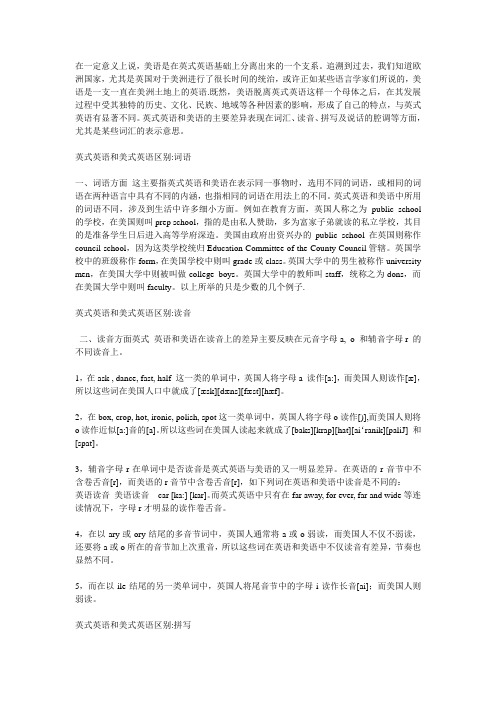
在一定意义上说,美语是在英式英语基础上分离出来的一个支系。
追溯到过去,我们知道欧洲国家,尤其是英国对于美洲进行了很长时间的统治,或许正如某些语言学家们所说的,美语是一支一直在美洲土地上的英语.既然,美语脱离英式英语这样一个母体之后,在其发展过程中受其独特的历史、文化、民族、地域等各种因素的影响,形成了自己的特点,与英式英语有显著不同。
英式英语和美语的主要差异表现在词汇、读音、拼写及说话的腔调等方面,尤其是某些词汇的表示意思。
英式英语和美式英语区别:词语一、词语方面这主要指英式英语和美语在表示同一事物时,选用不同的词语,或相同的词语在两种语言中具有不同的内涵,也指相同的词语在用法上的不同。
英式英语和美语中所用的词语不同,涉及到生活中许多细小方面。
例如在教育方面,英国人称之为public school 的学校,在美国则叫prep school,指的是由私人赞助,多为富家子弟就读的私立学校,其目的是准备学生日后进入高等学府深造。
美国由政府出资兴办的public school在英国则称作council school,因为这类学校统归Education Committee of the County Council管辖。
英国学校中的班级称作form,在美国学校中则叫grade或class。
英国大学中的男生被称作university men,在美国大学中则被叫做college boys。
英国大学中的教师叫staff,统称之为dons,而在美国大学中则叫faculty。
以上所举的只是少数的几个例子.英式英语和美式英语区别:读音二、读音方面英式英语和美语在读音上的差异主要反映在元音字母a, o 和辅音字母r 的不同读音上。
1,在ask , dance, fast, half 这一类的单词中,英国人将字母a 读作[a:],而美国人则读作[æ],所以这些词在美国人口中就成了[æsk][dæns][fæst][hæf]。
个人总结最全英语与美语的区别

英式英语与美式英语的区别一、拼写,美国人更注重实用性,因此美式英语的拼写比英式英语更简洁。
二、同一个词在英语和美语中可能指不一样的东西〔同词异义〕四、发音上的区别五、语法及表达1. 名词1-2. 集合名词做主语时,英国英语的谓语动词可以是单数形式或者复数形式,美国英语几乎是用单数形式英式:They are a family who has been very influential in the history of this country.美式或英式:The committee has decided to look into the matter further.1-3. 名词作定语时,美国英语多用单数形式,而英国英语那么常用其复数形式英式:The worker decided to form a new trades union.美式:The worker decided to form a new trade union.2. 动词英语中的to have 是个词性不明确的动词。
英国人既把它用作助动词又把它用作实义动词;美国人那么一律将它当作实义动词来用。
当动词have有致使之意时,美国用have;英国对上级用get,对下级用make.英语中的to have 是个词性不明确的动词。
英式:I will get someone come.美式:I will have someone come.3. 形容词在美国英语中,形容词的比拟级可以跟在all the 之后,表示强调。
而英国英语那么使用any 加形容词比拟级这一形式来表示强调英式:Can’t you do any better than that?美式:Is that all the better you can do?4. 时态表距现在不远的过去所发生或完成的事情,英国英语常用现在完成时,美国英语那么倾向于使用一般过去时英式:I have studied your report already.美式:I studied your report already.英式:Now I know what it is! I’ve forgotten its name.美式:Now I know what it is! I forgot its name.5. 日期表达英式用日月年,美式用月日年,且日期里的st,nd,rd不写出来英式:20th March, 1998 读作the twentieth of March, nineteen ninety-eight美式:March 20, 1998 读作March the twentieth, nineteen ninety-eight6. 数字读法6-1. 数字读法,如175英式:a/one hundred and seventy-five美式:one hundred seventy-five, 常省略and6-2. 表述房间号,号时,英式多用double,triple,美式那么直接读,三个连用时也用three +数字复英式9224:nine double two four美式9224:nine two two four英式60009:six triple one nine美式60009:six one one one nine;six three ones nine。
最全英语与美语的区别
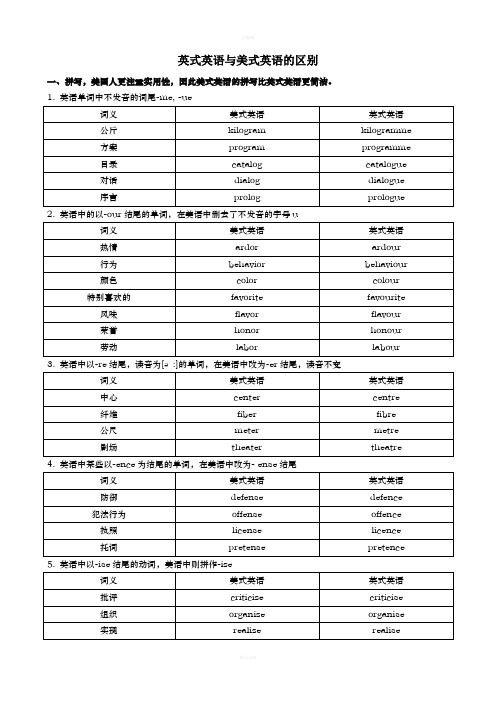
英式英语与美式英语的区别一、拼写,美国人更注重实用性,因此美式英语的拼写比英式英语更简洁。
1. 英语单词中不发音的词尾-me, -ue2. 英语中的以-our结尾的单词,在美语中删去了不发音的字母u3. 英语中以-re结尾,读音为[ə:]的单词,在美语中改为-er结尾,读音不变4. 英语中某些以-ence为结尾的单词,在美语中改为- ense结尾5. 英语中以-ise结尾的动词,美语中则拼作-ize6. 英语中以双写-ll-拼写的部分词,在美语中只有一个-l-7. 英语中以- xion结尾的词,美语中拼作-ction,读音不变8. 其他二、同一个词在英语和美语中可能指不一样的东西(同词异义)三、同一个意思,在英语和美语中分别用不同的词语(同义异词)四、发音上的区别1. 字母a2. 字母o3. 字母r4. 组合-ary和-ory结尾5. 以-ile结尾6. 其他五、语法及表达1. 名词1-1. 美国英语将其他词类名词化的倾向比英国英语更为明显,特别是那些带介词的短语动词1-2. 集合名词做主语时,英国英语的谓语动词可以是单数形式或者复数形式,美国英语几乎总是用单数形式英式:They are a family who has been very influential in the history of this country.美式或英式:The committee has decided to look into the matter further.1-3. 名词作定语时,美国英语多用单数形式,而英国英语则常用其复数形式英式:The worker decided to form a new trades union.美式:The worker decided to form a new trade union.2. 动词英语中的to have 是个词性不明确的动词。
英国人既把它用作助动词又把它用作实义动词;美国人则一律将它当作实义动词来用。
美国英语与英国英语的差异
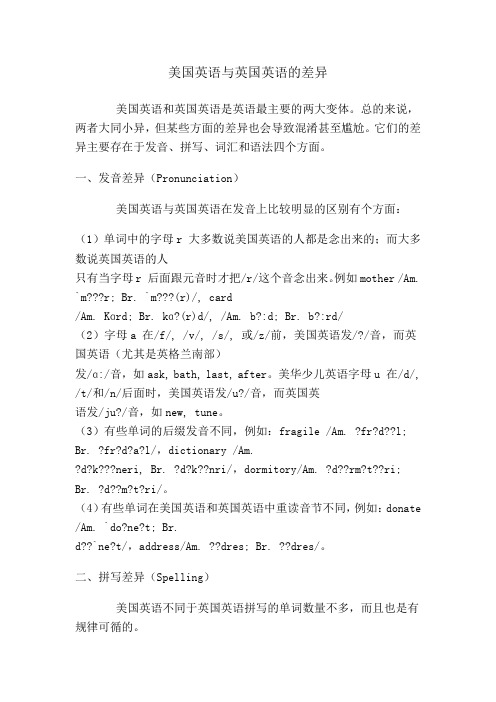
美国英语与英国英语的差异美国英语和英国英语是英语最主要的两大变体。
总的来说,两者大同小异,但某些方面的差异也会导致混淆甚至尴尬。
它们的差异主要存在于发音、拼写、词汇和语法四个方面。
一、发音差异(Pronunciation)美国英语与英国英语在发音上比较明显的区别有个方面:(1)单词中的字母r 大多数说美国英语的人都是念出来的;而大多数说英国英语的人只有当字母r 后面跟元音时才把/r/这个音念出来。
例如mother /Am. `m???r; Br. `m???(r)/, card/Am. Kɑrd; Br. kɑ?(r)d/, /Am. b?:d; Br. b?:rd/(2)字母a 在/f/, /v/, /s/, 或/z/前,美国英语发/?/音,而英国英语(尤其是英格兰南部)发/ɑ:/音,如ask, bath, last, after。
美华少儿英语字母u 在/d/, /t/和/n/后面时,美国英语发/u?/音,而英国英语发/ju?/音,如new, tune。
(3)有些单词的后缀发音不同,例如:fragile /Am. ?fr?d??l; Br. ?fr?d?a?l/,dictionary /Am.?d?k???neri, Br. ?d?k??nri/,dormitory/Am. ?d??rm?t??ri; Br. ?d??m?t?ri/。
(4)有些单词在美国英语和英国英语中重读音节不同,例如:donate /Am. `do?ne?t; Br.d??`ne?t/,address/Am. ??dres; Br. ??dres/。
二、拼写差异(Spelling)美国英语不同于英国英语拼写的单词数量不多,而且也是有规律可循的。
(1)美-ter;英-tre:center/centre; liter/litre;theater/theatre(2)美-or;英-our:color/colour; neighbor/neighbour;honor/honour(3)美-ense;英-ence:defense/defence; offense/offence(4)美-ize;英-ise/-ize:civilize/civilise (civilize); organize/organise (organize)(5)美-ll-; 英-l-:skillful/skilful; fulfill/fulfil;(6)美-l-; 英-ll-:traveling/travelling; traveled/travelled(7)某些动词的过去式和过去分词:learned/learnt;smelled/smelt; spelled/spelt; dreamed/dreamt; burned/burnt (8)其它:gray/grey; program/programme; tire/tyre。
英语英美英语差别比较全面PPT讲稿

3. 语法差异
(4)过去时与现在完成时:
表示距现在不远的过去所发生或完成的事情,英 国英语常用现在完成时,则美国英语则倾向于使 用一般过去时。例如: BE:I have studied your report already. AE:I studied your report already. BE:Now I know what it is! I’ve forgotten its name. AE:Now I know what it is! I forgot its name.
3. 语法差异
(2)动词 have ,get, make
当动词have有致使之意时,美国用have; 英国对上级用get,对下级用make.英语中 的to have 是个词性不明确的动词。英国 人既把它用作助动词又把它用作实义动词;
美国人则一律将它当作实义动词来用。例
如: BE: I will get someone come. AE: I will have someone come.
英语英美英语差别比较全面课 件
1. 单词差异
电梯 一楼 汽油 足球 假期 罐头 糖果
A.E elevator first floor
gas soccer vacation
can candy
B.E lift ground floor gasoline petrol football holiday
tin sweets
3. 语法差异
(3)形容词: 在美国英语中,形容词的比较可以跟在all the 之后,表示强调。而英国英语则使用any 加形容词比较级这一形式来表示强调。
例如: BE: Can’t you do any better than that? AE: Is that all the better you can do?
- 1、下载文档前请自行甄别文档内容的完整性,平台不提供额外的编辑、内容补充、找答案等附加服务。
- 2、"仅部分预览"的文档,不可在线预览部分如存在完整性等问题,可反馈申请退款(可完整预览的文档不适用该条件!)。
- 3、如文档侵犯您的权益,请联系客服反馈,我们会尽快为您处理(人工客服工作时间:9:00-18:30)。
舌头大挑战
1.Good cookies could be cooked by a good cook if a good cook could cook good cookies.
2.Ann sent Andy ten hens and Andy sent Ann ten pens.
3.Good cookies could be cooked by a good cook if a good cook could cook good cookies.
3. 语法差异
(1)名词:
集合名词做主语时,英国英语的谓语动词 可以是单数形式或者复数形式,美国英语 几乎总是用单数形式。例如:BE :They are a family who has been very influential in the history of this country. AE/BE: The committee has decided to look into the matter further.
realise
3. 发音差异一
1. a: ask, can't, dance, fast, half, path
2. o: box, crop, hot, ironic, polish, spot
3. r: car, door, river, party, board, morning
Note:英语中只有在far away, for ever, far and wide等连读情况下,字母r才明显的读 作卷舌音
3. 语法差异
(4)过去时与现在完成时:
表示距现在不远的过去所发生或完成的事情,英 国英语常用现在完成时,则美国英语则倾向于 使用一般过去时。例如: BE:I have studied your report already. AE:I studied your report already. BE:Now I know what it is! I’ve forgotten its name. AE:Now I know what it is! I forgot its name.
3. 语法差异
(3)形容词: 在美国英语中,形容词的比较可以跟在all the 之后,表示强调。而英国英语则使用any 加形容词比较级这一形式来表示强调。
例如: BE: Can’t you do any better than that? AE: Is that all the better you can do?
Main Differences of American English & British English
主讲:Dani
1. 单词差异
A.E B.E 电梯 elevator 一楼 first floor floor 汽油 gas gasoline petrol 足球 soccer 假期 vacation 罐
舌头大挑战
4.Bill's big brother is building a beautiful building between two big brick blocks
5. A flea and a fly were trapped in a flue (烟气管道), and they tried to flee for their life. The flea said to the fly “let‘’s flee!” and the fly said to the flea” Let’s fly!. Finally both the flea and fly managed to flee through a flaw(缺 陷) in the flue.
3. 语法差异
(1)名词:
名词作定语时,美国英语多用单数形式, 而英国英语则常用其复数形式。例如:BE: The worker decided to form a new trades union. AE: The worker decided to form a new trade union.
3. 语法差异
(2)动词 have ,get, make
当动词have有致使之意时,美国用have; 英国对上级用get,对下级用make.英语中 的to have 是个词性不明确的动词。英国 人既把它用作助动词又把它用作实义动词; 美国人则一律将它当作实义动词来用。例 如: BE: I will get someone come. AE: I will have someone come.
感谢下 载
lift ground
football holiday
B.E
公寓 apartment
1. 单词差异
A.E
flat
洗手间bathroom
橡擦 皮 eraser
restroom toilet rubber
手电筒flashlight 薯条
torch
2. 拼写差异
A.E B.E
对话
dialog
dialogue
发音差异二
A.E
clerk [klɚk]
either [aiðə]
issue [‘iʃu:]
leisure
B.E [kla:k]
[iðɚ] [‘isju:] [‘leʒə ]
3. 语法差异
(1)名词:
除上文讨论的词尾变化不同外。美国英 语将其他词类名词化的倾向比英国英语 更为明显,特别是那些带介词的短语动 词:to cook out →a cook-out ;to know how →the know-how; to run down →the rundown; to be shut in →a shut-in; to stop over →the stopover等。
妈妈பைடு நூலகம்
mummy
mommy
米
meter
metre
剧院
theater
theatre
中心 颜色
center color
centre colour
最喜欢的 favorite
favourite
B.E 组织 组织 意识到
拼写差异
A.E
organize organization
realize
organise organisation
